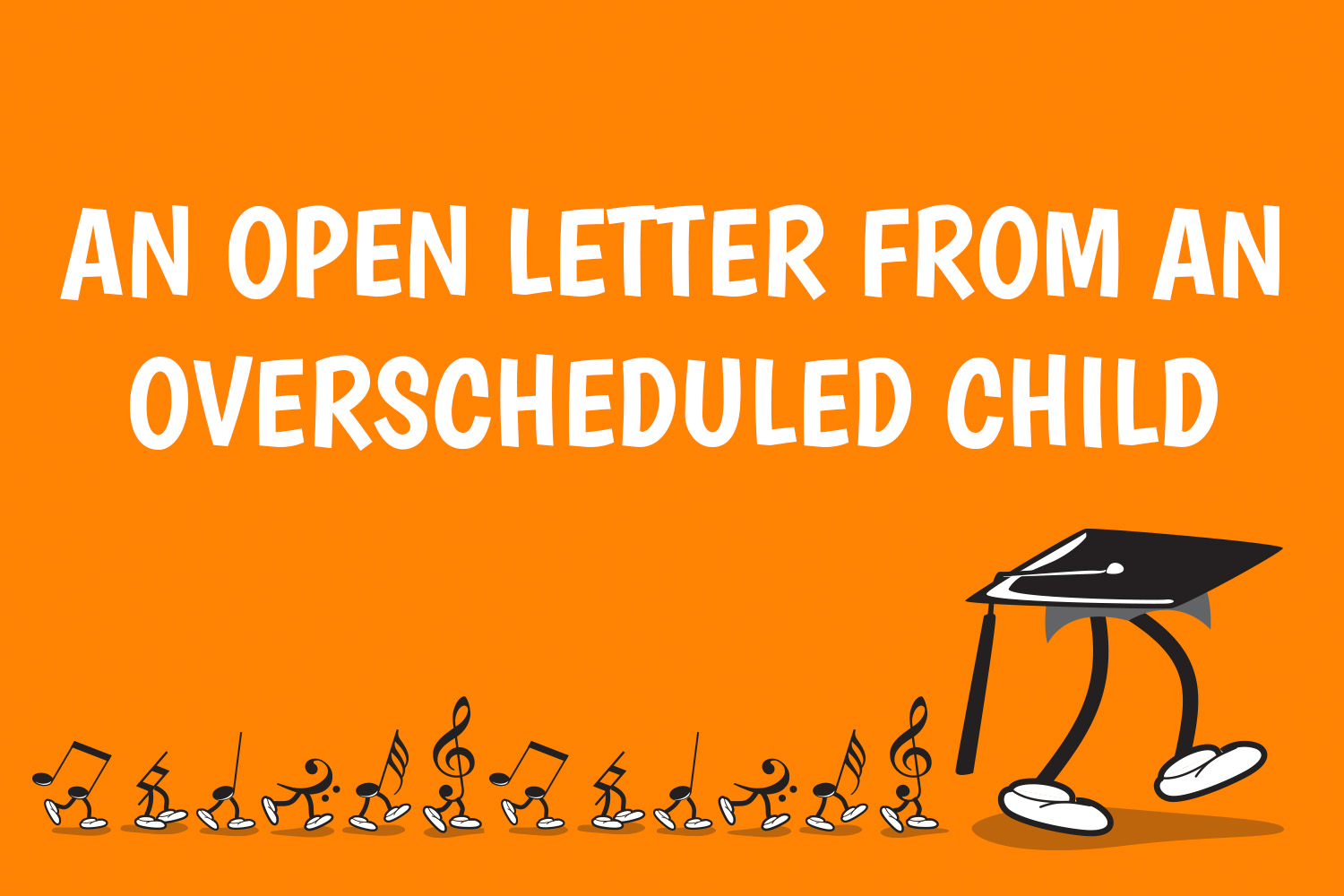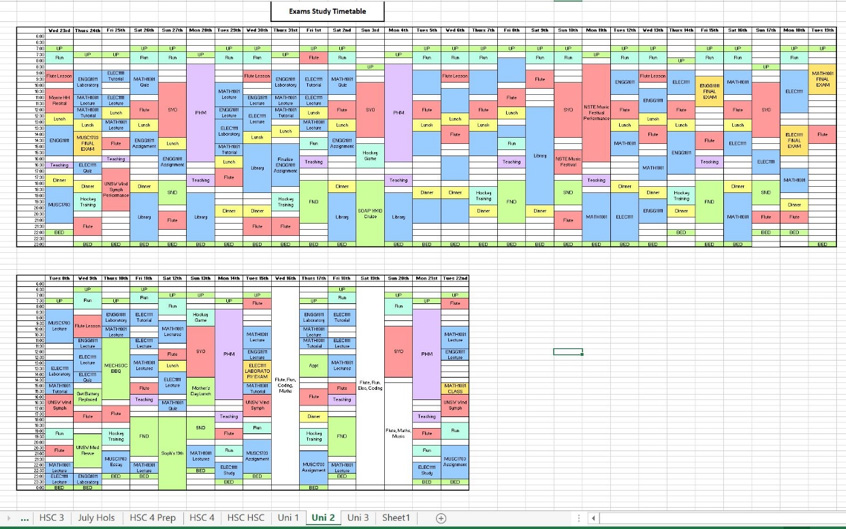An Open Letter From An Overscheduled Child


Let me start by levelling with you about the Uni and study timetable above – I didn’t always keep to it. But self-inflicted schedules like this beauty were more often than not my go-to for fitting everything in. Funnily enough, this isn’t sustainable long term! Who would have thought? After years and years leaping at every opportunity and upskilling myself as much as humanly possible (and often more), I’ve learned five things that I think every person aged 8 or up who’s got that perfectionist streak needs to hear. Or at least, needs to hear but ignore while they continue to pile up the activities. Everything in moderation – especially moderation! Here they are:
1. You can’t get maximum enjoyment out of unlimited things.
As much as I wish that one activity gives you x joy and that therefore 5 activities give you 5x joy, that doesn’t work. Not only because there comes a point when you’re under lots of stress from everything, but enjoyment saturation is an unfortunate reality. It’s a bit like having icecream for dessert – if you get it once a week, you look forward to it all week, and savour it. If you get it twice a week, you’ll probably still look forward to it and enjoy it. Once you get it 3-4 times a week, you still enjoy it, but perhaps don’t look forward to it as much because you get it all the time. And icecream every night? Eventually you stop even thinking about it until it’s practically in your mouth.
Now you’ve lost half of the fun of icecream: looking forward to it. It’s a terrible analogy, but it’s the same thing with all the things in your schedule activities. Make sure you have enough down time to build up excitement for the next thing.
2. You can do anything you put your mind to, but you can’t do everything you put your mind to.
I know that sounds frustrating, and it’s against what everyone always tells you as a kid. Or, perhaps more accurately, people told you “you can do anything if you work at it!” and you subconsciously translated that to “I have the potential to be good at everything, and therefore I should be good at everything”. Again, it doesn’t work, as much as one gives it their utmost. I’ve tried. And while I have no doubt that it’s working to some extent, until you can either let yourself be bad or even just average at something, and not just in the short term but indefinitely, or look at a new opportunity and turn it down because you’ve reached close to your enjoyment saturation, you’re never going to be able to truly enjoy the success you have at varying levels in varying things. Which brings me to my next point:
3. You can’t do anything without your health – so treat it with respect.
By health, I mean mental and physical. I’m talking actual down time without guilt of not being productive, sleeping a decent amount, and being able to say yes to a night in watching a movie, or a day away. I’m talking slowing down when you have a cold, giving yourself a quality sleep in once in a while, and truly giving yourself some slack if you’re sick and don’t perform as well as usual. You are not superhuman.
Someone once told me to write down all my facets of life on different pieces of paper – for me they were uni, work, family, exercise, practicing, teaching, ensembles, hockey, me time/health, and chores. Then they gave me 20 ‘energy’ pebbles and told me to distribute them how I divide my time among those things. The first thing I said was ‘Can I have more pebbles?’ Anyway, once I’d divided them, they said things like “okay, its exam time, put some more on uni” or “your mum needs you to do some extra chores, she’s working lots”. I had to move my pebbles around in the way that I would react. Every single time, I moved one off “me time/health” and onto the other page. And that’s what I do. Whether it’s because I don’t want to let others down or because I truly just don’t think it’s as important, my health has suffered a lot over the years because it’s the first buffer to go. If this rings true, consider having a baseline number of ‘pebbles’ in your health zone that are non-negotiable. I have 3 now, and I refuse to move them. And quite honestly, it sets me up in a sustainable way that I’ve never had before to really excel at whatever I’m doing.
4. Treat yourself as you would treat a dear friend.
One thing that I find helpful for keeping myself in check is asking myself “would you expect this of another person?” or in the case of negative self-talk, “would you say that to your friend?” The answer is almost always no.
I would never dream of walking up to my friend and saying (after 3 days of being at the library until 10pm): “it’s absolutely disgusting that you slept in today and didn’t have a chance to do some extra piano practice. I don’t know how you’re ever expecting to be any good at anything if you can’t even get things done.” Never. But we often hold ourselves up to a gross double standard, being angry at ourselves for something which we would instantly forgive another.
Trying to treat yourself as you would a loved one is often a fast track to a bit of compassion. And compassion is so important.
5. Have a ‘red flag list’, and check it regularly.
Another thing I have now is a list of red flags, so that I can physically check to see if things are piling on too thickly (something that often happens without me noticing). I’ve found it incredibly helpful, and highly recommend that everyone writes themselves one. Here’s mine:
- getting weirdly stressed when I’m unexpectedly asked to do something extra
- noticing that I haven’t read for pleasure in more than 2 weeks
- shaving a bit of time off everything in my day to fit in one more thing
- making ridiculous timetables that have activities from before 7 to after 10 every day
- spending all my public transport time doing work
- finding that my next available ‘slot’ for socialising is more than 3 weekends away
Obviously it’s unique to everyone, but it’s very interesting to investigate what slips first from your life.
I don’t know a one-size-fits-all method for ensuring you or your child isn’t unhappily overscheduled. I do know, from being an overscheduled child myself, that I needed to hear that I was defined by more than what I achieved. I needed to hear “yes, sure we can try it, but are you going to enjoy girl guides if you have to rush there from music and rush off to rehearsal?”. I needed to hear that pushing through sickness had its limits.
I spent the first 10 years of my life being told that I was “gifted” and “talented”, and I spent the next 10 attempting to be superhuman to live up to that; each new achievement became my new baseline. I needed to hear that I was enough, achievements or no. I’m still learning this, and I hope you can too.

Beautiful. This article speaks volumes.
Hooray, Courtney! So well written. Your brave admissions are hugely important for everyone to hear. Here’s to a well-balanced reasonably-scheduled adulthood…
Thank you Leila!
Thank you for your wonderfully wise words, Courtney! I need too heed this advice just as much as the over-scheduled students in my studio need it.
Thank you Courtney. Your words ring true. I will share your article with my daughter 😊 Ever thought of sharing your experiences and insight with high school students at school? They would benefit so much.
Louisa, I will certainly raise that with her. I can imagine her doing a moving alumni speech 🙂